Book contents
- Social Justice in Twentieth-Century Europe
- Social Justice in Twentieth-Century Europe
- Copyright page
- Contents
- Contributors
- Acknowledgements
- 1 Social Justice
- 2 Social Justice within a Market Society
- 3 Catholic Conceptions of Social Justice from 1891 to Pope Francis
- 4 Social Justice through Taxation?
- 5 A Fascist Social Justice?
- 6 Social Justice in Authoritarian Central Europe
- 7 Social Justice in a Socialist Society
- 8 Immigrants and Social Justice in Western Europe since the 1960s
- 9 Reimagining Peace through Social Justice in Mid- to Late Twentieth-Century Europe
- 10 Social Justice or Sexual Justice?
- 11 Equity Rules
- 12 Bridging the Void
- 13 Postscript
- Index
9 - Reimagining Peace through Social Justice in Mid- to Late Twentieth-Century Europe
Published online by Cambridge University Press: 29 February 2024
- Social Justice in Twentieth-Century Europe
- Social Justice in Twentieth-Century Europe
- Copyright page
- Contents
- Contributors
- Acknowledgements
- 1 Social Justice
- 2 Social Justice within a Market Society
- 3 Catholic Conceptions of Social Justice from 1891 to Pope Francis
- 4 Social Justice through Taxation?
- 5 A Fascist Social Justice?
- 6 Social Justice in Authoritarian Central Europe
- 7 Social Justice in a Socialist Society
- 8 Immigrants and Social Justice in Western Europe since the 1960s
- 9 Reimagining Peace through Social Justice in Mid- to Late Twentieth-Century Europe
- 10 Social Justice or Sexual Justice?
- 11 Equity Rules
- 12 Bridging the Void
- 13 Postscript
- Index
Summary
The history of peace research offers a window onto mid-twentieth-century European political thought in transformation. This chapter focuses on the transformation of peace research from the 1960s to the 1980s, as it evolved a radical and trans-national approach to politics, linking developmentalist concerns with decolonisation and economic underdevelopment at the global scale to a critique of social hierarchies at the national scale. Historically located both after the post-war pursuit of European peace through economic growth and regional integration and before the emergence of Euromissile peace movements of the 1980s, one strand of peace research soon became an approach to social justice all of its own, and came to be known as ‘positive peace’. Positive peace was most prominent in the Nordic countries, where it offered a means of connecting nationally framed accounts of social democracy to more radical and utopian calls for social justice on all political scales. During these years of international encroachment and domestic upheaval in Europe, positive visions for peace provided a space within which European intellectuals responded to newly recognised global-scale injustices such as the Vietnam War and the spectre of global famine, as well as building a more just social order at home.
- Type
- Chapter
- Information
- Social Justice in Twentieth-Century Europe , pp. 185 - 204Publisher: Cambridge University PressPrint publication year: 2024



